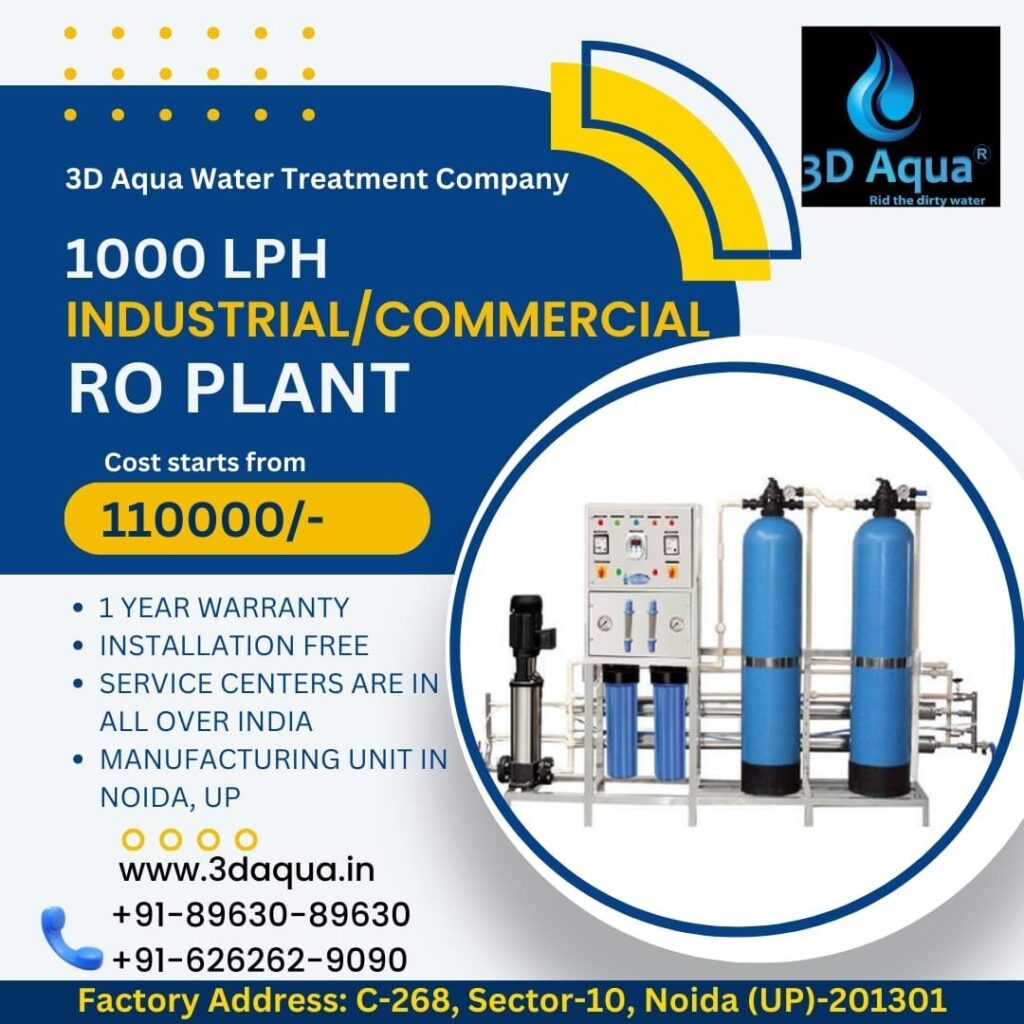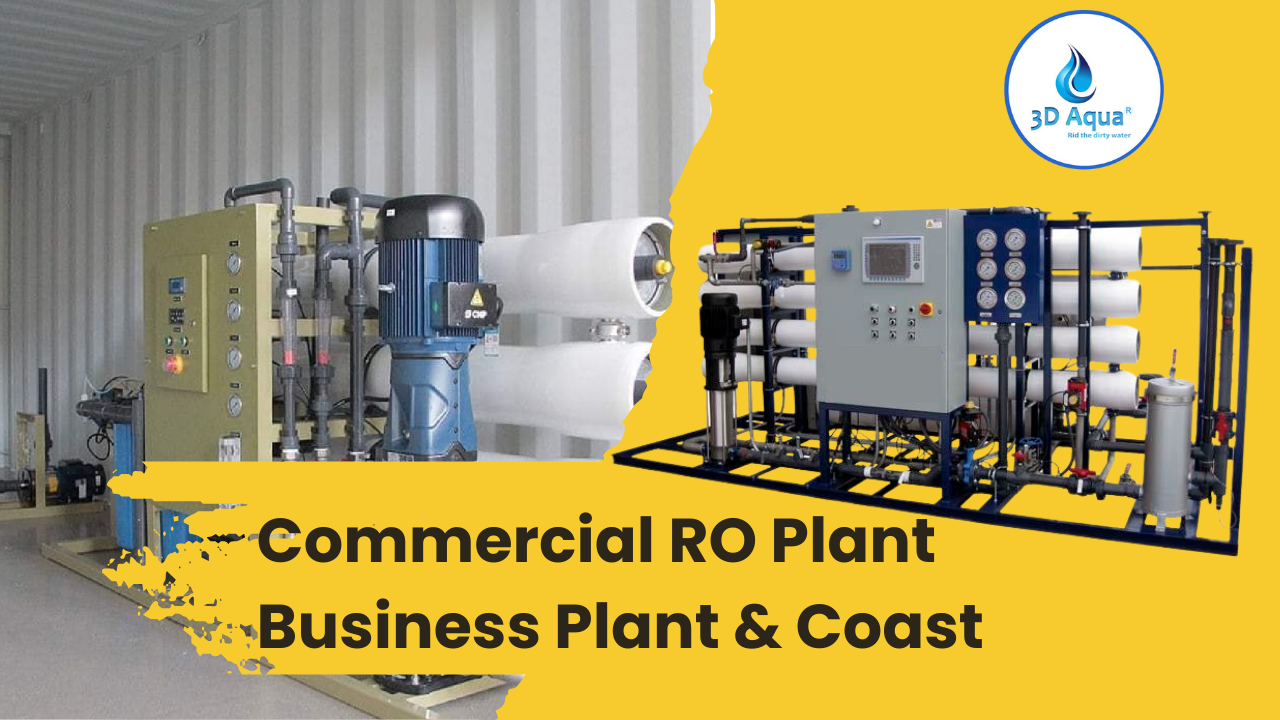Starting a commercial Reverse Osmosis (RO) water plant business can be a highly profitable and sustainable business, especially with the rising concerns over water pollution and depleting groundwater levels in India.
As the demand for clean and safe drinking water continues to grow, setting up an RO water plant presents a great opportunity for entrepreneurs looking for a scalable and long-term venture.
Whether you plan to establish your plant in major cities like Delhi and Noida or in smaller towns, this comprehensive guide will help you understand the essential steps, costs involved, legal requirements, and the potential profitability of this business.
Why Commercial RO Water Plant Business is Profitable in India
The demand for clean and safe drinking water has skyrocketed in India due to increasing water contamination and health concerns.
As per various reports, groundwater pollution and unsafe drinking water sources have become major health hazards. This has led to a significant rise in the demand for purified drinking water, especially in the form of bottled water, jars, and even packaged pouches.
The rise of water-borne diseases, coupled with government policies to provide safe drinking water, has made the water purification business lucrative. In this article, we’ll cover everything you need to know before venturing into a commercial RO water plant business in India.
Steps to Start a Commercial RO Water Plant
To set up a successful commercial RO plant business, there are several key factors you need to consider. These include market research, location analysis, legal registration, investment requirements, and more. Let’s break it down into a detailed step-by-step process:
1. Conduct Market Research
Before jumping into the business, it’s essential to understand the market dynamics. Here are some important points to research:
- Demand in Your Area: Analyze the demand for purified water in your city or region. Check local water quality, contamination levels, and the existing competition in the bottled water industry.
- Target Customers: Identify your target customer base, whether it’s households, offices, hospitals, schools, or factories that need large volumes of purified water.
- Pricing: Conduct a competitive analysis of the pricing strategies for bottled, jarred, or pouch-packed water.
2. Site Selection & Space Requirements
Choosing the right location for your commercial RO water plant is crucial. The site should be accessible, close to the water supply, and have adequate space for installation, production, and packaging. A large area will allow you to scale your production in the future.
3. Test the Water Quality
Before setting up your RO plant, you must test the Total Dissolved Solids (TDS) and other minerals in the water. The TDS level will determine the kind of RO system and membranes you will need for your plant.
4. Choose the Right Capacity Plant
A small RO plant like a 500 LPH (liters per hour) or 1000 LPH can be a good starting point for small businesses. However, based on your research and target market, you may need to opt for a larger capacity plant.
Commercial RO Water Plant Registration Process in India
Setting up a commercial RO water plant is not just about purchasing equipment—it requires legal and regulatory compliance. Below are the key registrations and licenses required to operate legally in India:
The cerfitifacation required as per area and government norms (for any quiry related certification call us: 6262629090)
1. Business Registration
First, you must register your business as a firm or company. You can either register it as a sole proprietorship, partnership, or limited liability company (LLC), depending on your preferences and business structure.
(not need for small plant in domestic in local area)
2. BIS Certification
Since your product is intended for human consumption, you need approval from the Bureau of Indian Standards (BIS). The ISI mark is mandatory for bottled water plants in India, and it certifies that your water complies with safety and quality standards.
(not need for small plant in domestic in local area)
3. Pollution Control Certification
Your commercial RO plant must comply with local environmental regulations. You will need to obtain a pollution control certificate from the local pollution control board, confirming that your plant does not contribute to water or air pollution.
(not need for small plant in domestic in local area)
4. Pest Control Certification
As food-grade water is susceptible to contamination, pest control is essential. This certification ensures that your water production area is free from pests.
(not need for small plant in domestic in local area)
5. Feed Water Test Report
A feed water test report from a certified laboratory is necessary to assess the water quality before it enters the RO filtration system. This report will also guide the design of your RO system.
(not need for small plant in domestic in local area)
6. Small Scale Industry Registration
If you’re starting on a small scale, you need to register as a Small Scale Industry (SSI) or MSME (Micro, Small, and Medium Enterprises). This can help you avail of various government schemes and subsidies for small businesses.
(not need for small plant in domestic in local area)
Licenses Required for a Commercial RO Plant Business
In addition to the basic business registration and certifications, the following licenses are also required:
- Food Safety and Standards Authority of India (FSSAI) License: Ensures that your water meets the food-grade standards set by FSSAI.
- Trade License: A local license from municipal authorities to operate a business in your area.
- Factory License: If your production capacity is high, you will need a factory license from the concerned authority.
The cerfitifacation required as per area (for any quiry call us: 6262629090)
Commercial RO Water Plant Investment and Cost Estimation
The cost of setting up a commercial RO water plant can vary significantly based on the scale, location, and technology used. Below is a breakdown of the basic investment required:
Factors Influencing Investment
- Water TDS and Mineral Content: Depending on the local water quality, the type of RO system required may vary.
- Production Capacity: The size of your plant (e.g., 500 LPH, 1000 LPH, or more) will influence costs.
- Packaging Options: Whether you’re bottling water, packaging it in jars, or offering it in pouches, the packaging options will impact your overall investment.
- Business Location: The cost of real estate varies from city to city and will contribute to the total setup cost.
- Utilities and Equipment: The cost of purchasing RO membranes, filtration systems, storage tanks, packaging units, and transportation vehicles.
Basic Commercial RO Water Plant Cost
A 500 LPH commercial RO water plant typically costs around ₹50,000-₹1,00,000, depending on the quality of the system and its components. If you opt for higher production capacities, like 5000 LPH or 10000 LPH, the cost can escalate up to ₹50 Lakhs or more.
Detailed Cost Estimation for a 1000 LPH RO Plant
For a 1000 LPH plant, the cost breakdown could look like this:
- RO Water Plant Setup (1000 LPH): ₹3,00,000 – ₹5,00,000
- Packaging Plant (Bottling/Jar Filling): ₹2,00,000 – ₹4,00,000
- Building/Space Setup: ₹2,00,000 – ₹4,00,000
- Raw Materials (Packaging, Bottles, etc.): ₹1,00,000 – ₹2,00,000
- Labor and Overheads: ₹1,00,000 – ₹2,00,000
Overall, the cost for a medium-sized RO water plant with packaging facilities can range from ₹7,00,000 to ₹15,00,000.
For affordable RO plant services across India and global exports, contact 3D Aqua. We offer competitive prices based on location and materials. Reach out for any inquiries!
Call Now: +91 6262629090
Commercial RO Plant Business Profit & Margin Calculation
Understanding the profit potential is critical before making an investment. The profitability of a commercial RO water plant business depends on several factors like production, pricing, distribution, and operational costs. Here’s a sample profit calculation based on an average-sized plant:
Yearly Production
- Daily Production: 8000 bottles
- Yearly Production: 8000 bottles x 365 days = 2,920,000 bottles
Crates Calculation
- Assuming each crate contains 12 bottles:
- Crates per Year: 2,920,000 / 12 = 243,333 crates annually
Turnover Calculation
- Selling price of one crate: ₹80
- Total Turnover: 243,333 crates x ₹80 = ₹1.94 Crore annually
Production Cost
The total cost for producing 243,333 crates annually can be broken down as follows:
- Raw Material Costs (Bottles, Water, etc.): ₹60 Lakhs annually
- Labor and Staff Costs: ₹24 Lakhs annually
- Utility and Operational Expenses: ₹30 Lakhs annually
Profit Calculation
- Total Revenue: ₹1.94 Crore
- Total Production Cost: ₹1.44 Crore
- Net Profit: ₹1.94 Crore – ₹1.44 Crore = ₹50 Lakhs annually
Profit Margin
The profit margin in a commercial RO water plant business can be around 30-40%, depending on the efficiency of operations and market conditions.
Conclusion: Is Starting a Commercial RO Water Plant Profitable?
Starting a commercial RO water plant in India can be a highly profitable venture, with increasing demand for clean and purified water.
With a relatively low initial investment, and the ability to scale production, this business offers long-term potential for growth.
If you plan strategically, maintain high product quality, and stay compliant with all necessary regulations, you can achieve substantial profits in the bottled water industry.
If you’re considering starting a commercial RO plant business, get in touch with experts like 3D Aqua Water Treatment Company for the best plant setup, consultation, and equipment procurement.
We provide advanced water treatment solutions tailored to your business needs.
For more details or assistance in setting up your RO plant, contact us at:
- Phone: +91-6262629090



